Lee Collins's Blog, page 2
August 3, 2012
A Strange Craving
Lately, I’ve found myself at the behest of some rather odd desires.

Google image search for “odd desire”: this and a chess set made of dicks.
Disappointingly, these desires have very little to do with any sort of experimentation. No additional fruit will be purchased at the store this weekend. These desires would seem much more ordinary were I a 14-year-old girl, I think. Since I am not, I am forced to conceal them from colleagues and passersby alike (the desires, not the 14-year-old girls). Were I to voice them, I would surely become the victim of sidelong glances, queries into my well-being, and swirlies. Thus, the only avenue of expression left to me is the one place nobody ever sees anything: the Internet.
I really want to play Harvest Moon.

“lol fag”
Okay, so maybe not Harvest Moon specifically, but I’ve really wanted to play some sort of production-themed game. I’ve had my eye on the new(ish) Rune Factory title for awhile, but I’ve become almost exclusively a PC gamer these days. As such, I was thinking about picking up Sim City 4. User reviews insist that the game has a steep learning curve, though, and financial frustration isn’t exactly the escapism venue I’m hoping for. Even if I were able to triumph over the economic hardships of the Simverse, I’m not sure SC4 would scratch this particular itch. I’ve even toyed with the idea of becoming a manufacturer in EVE, but my lack of supporting skills, a private station, nine years of training, and twelve hours of free time per day put me at a disadvantage in that particular market.
What is perhaps even more perplexing is where this desire originated: fuck if I know. I’m usually content with my RPG/MMO/TBS/Steam sale cocktail, so I have no idea why I suddenly have a craving for a particular type of game. Hell, even having a game craving is rather rare for me. The urge to play a specific game will occasionally hit (almost exclusively when I don’t own said game), but I usually pick the evening’s entertainment on the fly. Why, then, do I have a powerful urge to grow crap on a pretend farm? Perhaps my electronic conscience is demanding nonviolent entertainment for once. Perhaps I am looking for even more non-stressful ways to relax. Perhaps I am feeling the need to create something again and am desperately hoping to stave it off with pointless games before it becomes another book.
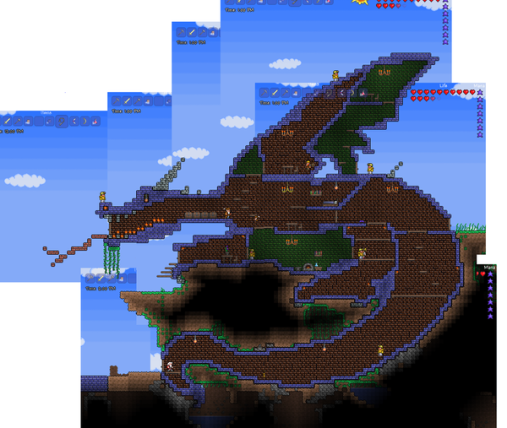
This counts as literature, right?
Oh well, time to go play more Civ. If anyone has any recommendations for Harvest Moon-esque games for PC, I’m open to suggestions.


July 27, 2012
Guest Post – Lie to Me: Guild Wars 2 & the Evolution of MMOs by Rob Haines
MMO beta weekends are odd little snapshots of gaming; throw a bunch of early-adopters into a expansive game world for 48 hours and watch most of them never make it out of the starter zones before you shut up shop and delete everyone’s progress. That said, the hours I sunk into the Guild Wars 2 beta this past weekend were anything but wasted.
I could wax lyrical for hours about the things I loved about GW2 – my Asura’s personal story of stolen inventions and warring tech enclaves; the communal events that rewarded people for playing together without being dicks about it; that not once did I have to deliver 20 rat scrota to some guy with a punctuation mark halo – but I couldn’t help but consider how GW2, alongside other interesting examples of the latest wave of MMOs, are helping to progress the genre away from its stereotype of ‘grind monsters for loot’. No matter how good the world and the lore and the end-game content of an MMO are, if the primary aim of the game is simply to kill the same gaggle of foes over and over again for hours at a time it becomes like working a shift on a production line. Endless repetition, broken up by occasionally sweeping up discarded debris from the floor.
The trick seems to be to make a game which actively rewards doing interesting things, then filling the world with fun stuff to do. In GW2, you gain more XP from exploring nooks and crannies than you do from smashing an army of random mobs. You get big XP bonuses for killing more than ten different types of enemy a day, or for clambering to the top of buildings and mountain peaks for Assassins Creed-style camera-swirl viewpoints (even if the actual jumping controls are decided unsuited to the precision being asked of them). You progress even faster by joining randomly-occurring local quests which flash up in the corner of your screen, quickly degenerating as an influx of players struggles to cooperate, stringing together combo attacks or working to revive downed players. And it mostly works.
After a weekend of play, Guild Wars 2 reminds me of Disney World. You wander through brightly-coloured worlds full of automata spouting pre-recorded lines, and there’s always something new to look at, some new toy to play with or ride to experience. And just when things are beginning to feel predictable, a spontaneous parade erupts and everyone’s cheering and having fun.
Until you come back again for the second day; you’ve already been on the rides you gave a damn about, and when an identical parade erupts just as spontaneously for the new arrivals as it did back when you saw everything with neon-tinted glasses, the illusion begins to waver. The world is never as dynamic as you think it is, but while you can believe in it you’ll have a lot of fun.
But I can’t imagine going back to Disney World for a third day; all I’d have to look forward to is the slow degeneration of fine illusion into mundane reality. Perhaps GW2 can sidestep that through progression – by day three I’d be levelled up enough to move out of the starting zones and into the wide world – but whether the full game can keep up that sense of momentum throughout is beyond the bounds of a weekend of play. And if not, at least I won’t be spending fifteen bucks a month for the pleasure of grinding my way to level 80.
Rob Haines is a writer, podcaster and ex-turtle biologist. You can find him at Generation Minus One [http://www.generationminusone.com], or follow him on Twitter (@rob_haines).


July 6, 2012
A Brief Reflection on My Time in Kingsmouth
I’ve spent much of the past week in the charming New England town of Kingsmouth. It’s one of those places that seems trapped in time. Unlike the quiet hamlets in central Iowa that typically merit such descriptions, however, Kingsmouth is not of the belief that Eisenhower is president and horn-rimmed glasses are fashionable. No, Kingsmouth is perpetually celebrating that most fantastic of holidays: Halloween.
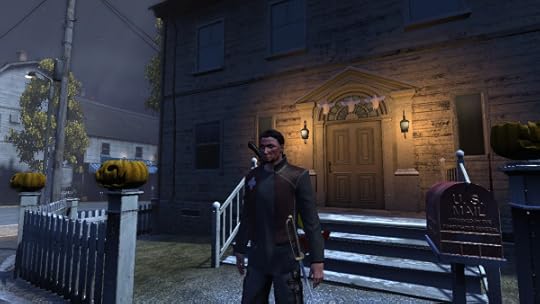
It’s serious business there.
As the first exotic destination in the newly-released MMO The Secret World, this quaint town is not without its problems. For example, I thought I would spend my first evening enjoying a quiet drink on one of the many piers along Fletcher Bay. Not only was the place I chose somewhat rundown, but the service was terrible and the wait staff lacked charisma.

I only tipped ten percent.
Once I was done taking in the local charm, I set to work exterminating all manner of evil things. Zombie, draug, wendigo, and hippie alike fell before my sword and my axe (yes, my in-game persona is as awesome as Aragorn and Gimli combined). It only took me about a week to play through most of the Kingsmouth quests at a fairly casual pace of 2-4 hours per night. My storyline now calls me toward the Savage Coast, but I have temporarily delayed my progress so I might serve as Tori’s guide through the lovely port town.
Things I Liked
-Horror-themed MMO. Let me say it again: HORROR-THEMED MMO. After spending years frolicking about lesser copies of Middle-Earth, MMO players now have the chance to crawl down the twisted paths of dark mythologies ancient and modern. No more elves with floppy ears and orcs with horrible dental hygiene. Now we can explore modern cities, crushing the un-life out of Lovecraftian spawnlings and ancient Egyptian deities. Even better, Funcom gives the player NPCs with personalities and dialogue that is fun to listen to.
-The ability wheel lets you take your character in any and all directions you choose. Equipping seven active and seven passive abilities gives you a “deck” of skills, much like a Magic: the Gathering player’s deck. As you can see from the screen shots, my character favors swords and hammers/axes, but I’ve also started exploring the mysteries of chaos magic. I’m intending to craft a solid tanking deck for running dungeons before branching out into heavier damage-dealing powers. The powerful system for selecting and equipping powers means I don’t have to roll and level different toons to play various roles. There are no tank, healer, or DPS classes, just different builds.
-Combat is a good blend of traditional hotbar with the flexibility of free movement. Spells and other channeled abilities don’t require nailing your boots to the ground, and most mobs have some sort of AoE power (advertised by white lines on the ground) that one would do well to dodge roll away from. While still not up to par with true hack-and-slash titles, it’s still a cut above standard MMO offerings.

The mesquite beans are also quite tasty.
Things I Didn’t Like
-As with most MMO launches, there are quite a few bugs. Quests glitching out, rough animations, server dumps, etc. Teething problems happen to all games, and Funcom has actually weeded a surprising number of them prior to launch (I was in Skyrim was at launch, but that doesn’t mean the bugs are any less annoying.
-I rolled my character on the RP server Arcadia hoping to find two things: a strong roleplaying community and a lesser chance of moronic toon names. I haven’t joined up with any serious RP guilds yet, but the vapid chatter and rampant spoilers in every chat channel I’ve joined (local, global faction, and help) are absurdly effective immersion-breakers. Similarly, the server rules (if there are any) regarding character names are not enforced to any degree I’ve seen. I’m not one to go around reporting violators, but the sheer amount of idiocy people display in their name choices never ceases to amaze.

In a perfect game, I would be able to set any poorly-named player alight with my mind.
Verdict: I’ve been anticipating this game for four years now, so it’s frivolous to restate my opinion here. I own it, I play it, I love it. Furthermore, I seriously recommend it to those questioning the future of the MMO. After the disappointment that was SW:TOR, you may be mistrustful of the genre as a whole. While not perfect, The Secret World builds on tried-and-true delivery methods while innovating in all the right areas.








July 2, 2012
The Shortest Page, the Longest Struggle
In high school, I always thought one of the best parts about being in a band would be getting to write the “Thanks to” sections for each album. It was a chance for the band members to give shouts out to friends, family, and colleagues. I loved reading them because it made the musicians I so admired seem more human. They would also drop inside jokes I didn’t get but still laughed at because people in bands are cool.

I have this on good authority.
Book acknowledgements and dedications are similar. A short list of people who helped make the book happen plus an personal italicized message. Just give shouts out to your friends and family, maybe name drop a few, be funny. Work up a sweet nothing if you (like me) are dedicating the book to a significant other. When you’re done, pour yourself a glass of something, lean back, and cogitate. Like train etiquette, it seems like super simple stuff.
It’s not.
At least not for me. I’m sure other authors have a much easier time of things like that. And, to be honest, the acknowledgements didn’t take me all that long. I had a good idea of who I wanted to include by name, and I kept it short so as not to bore the few that might read it. One or two inside jokes for good measure, and I’m done.
The dedication, on the other hand, was a monster. I spent a full month trying to come up with something absolutely fantastic, something beautiful and stirring, something that might approach the level of meaning I wanted to infuse into the few words I was permitted. Something perfect. Having written poetry long before trying my hand at prose, I am familiar with obsessing over word placement. Yes, fiction writers do it, too, but as someone who has successfully composed both, I can say the process is different. My poetry subscribes to the “economy of words” philosophy; I don’t blather on in my stanzas, preferring to keep them tightly-focused and potent. With that sort of background, one might think I’d be well-equipped to tackle something like a novel dedication.

You can almost hear the imagery crackle.
Well, one would be wrong. I spent more time trying to come up with a single line than I spent drafting the synopsis of She Returns From War. You only get to dedicate a first novel once, after all, and I wanted it to be perfect. However, after spending many weeks working and reworking various ideas in my head, I finally had to go with something I fear falls short of that goal. Really, though, how do you sum up the entirety of a loved one’s undying belief and support in a single line? If there exists such a level of writing prowess, I have not attained it. So, much like the larger work of the novel, the single line of dedication is something that may never reach the divine ideal hoped for at the outset.
It somehow feels like a greater failing, though. Sure, nobody can ever write the perfect a novel. It’s big, it’s complex, it has all of those stupid words in it. A beast of many backs that can never truly be domesticated. A dedication, on the other hand, is just one line. One. Line. If you can’t perfect that, perhaps you should give up the whole writing gig altogether. So say the whispers of insecurity, and who’s to say they’re wrong?

This guy.
Anyway, the deadline for the dedication came upon me last week, so I went with something I hope serves as a portal into the universe of gratitude I feel. It’s something of an inside joke, but it isn’t the kind that makes every other person return their breakfast to the earth via the most direct means possible. I’m not perfectly happy with it because it isn’t perfect. In fact, I’m more apprehensive about how Tori will like it than I am about how book critics will view the novel itself. Perhaps my priorities are askew. Then again, it’s highly unlikely I’d have ever written the book I did without her support.








June 20, 2012
My First Book (Covers)
A friend of mine told me that this post had to be epic. No reason was given. I am accustomed to following arbitrary directives from my friends, however, so I began speculating how I might bring such epicness to bear. The speculation ended rather quickly with the realization that all of the hard work had already been done for me by the mighty Chris McGrath:

Epic post achieved.
I confess to complete and utter ignorance in the realm of cover art. Never having been particularly proficient at visual art, I didn’t study it much (only taking one class in high school). The massive, dynamic world of cover artists went subconsciously heeded at best except for the occasional gripe at an inconsistency. When I finished my first draft of The Dead of Winter, I slapped a picture of a moon over a snowy forest on the front page when I sent it out to friends for beta reading. I spent literally minutes combing through Google images for a perfect decent picture of wintry doom to accompany my manuscript. Little did I know that the perfect cover could only be had by signing on with a wrathful publisher and letting them bring in a AAA-caliber artist to breathe spirit and soul into the characters.
I say “spirit and soul” rather than “life” because Chris McGrath did more than fashion physical forms for characters that (in my mind) were visually nebulous. When the Robot Overlords asked for physical descriptions, I was able to trot them out in short order, but I didn’t envision them in my head. I never had, really. When I write, my characters are words and thoughts and actions and reactions. They interact, they murder, they weep, and they laugh. They do all this in my virtual headspace, mostly divorced from the physical forms they take therein. They are spirits, flitting briefly into the physical plane before returning to the great ether.
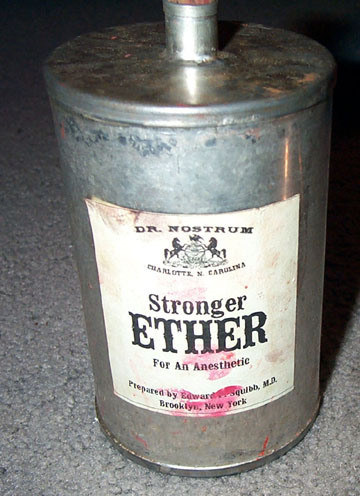
Which I keep in a can under the table.
In creating these covers, Chris McGrath captured those ethereal essences in a way I could never have imagined. When I first saw the proofs, my sense of wonder and excitement was augmented by something else, something almost eerie. For the first time since I brought them into the world, I was actually seeing Cora and Benjamin Oglesby. The ferocious determination sparking in Cora’s eyes, the way Ben cradles the book in his arm, the overpowering threat of coldness and death surrounding them…it was all perfect. I don’t know if Chris read the manuscript prior to completing the work or not (he says it varies from job to job). If he didn’t, I recommend the skeptics of the world start testing him for psychic powers. I can’t fathom how he so precisely captured my characters based solely on third-party description.
Then again, he’s just that good. Both proofs arrived in March, at which point only a handful of people–a subset excluding the Robot Overlords themselves–had read She Returns From War. In January, Marc asked for scenes from the book that might make for a good cover. I sent him a few possibilities (at least one of which I hadn’t written yet), frustrated by my own inability to adequately describe them. Chris somehow transformed those lackluster outlines into a singularly haunting image that captures the essence of the story in a way I myself hadn’t yet realized. If having my characters stare back at me from The Dead of Winter’s cover was eerie, seeing the art for a book I had only just finished drafting was downright unsettling.

Granted, some people probably wouldn’t find it all that strange.
So here’s to you, Chris McGrath. Thank you for capturing the essence of Cora Oglesby with such grace, precision, and beauty. You probably hear such sentiments a lot in your line of work; I hope the repetition fully reinforces the belief that you do damn fine work. If ever our paths should cross, dinner’s on me.








June 12, 2012
Discussion: Tomb Raider, Video Games, and the Portrayal of Women Therein
As the risk of alienating what little readership this blog possesses, I am going to weigh in on the recent Internet outrage regarding the new Tomb Raider title and the larger issue of how the video game industry portrays women. This is by no means an exhaustive post, and despite my intense passion for the medium, finite time and funding limit my knowledge of current gaming trends rather severely. Still, I will attempt to engage in what is meant to be thoughtful dialogue, and anyone stopping by is welcome to chime in.
Chuck Wendig’s post on the Tomb Raider reboot prompted a brief foray through other thoughts on the subject of violence against women in gaming culture. As a life-long gamer, the absurd level of female objectivization found in many games is nothing new to me. I’ve played games by Team Ninja and Capcom; I’ve chuckled at the ludicrous “real-life breast physics” of Dead or Alive 3; I’ve felt manly and heroic for rescuing Princess Zelda from Ganondorf’s clutches; I’ve run over hookers in Grand Theft Auto. Somewhat ironically, I’ve never played a Tomb Raider title precisely because marketing for those titles convinced me that Lara Croft was scarcely more than a vapid action hero with plus-sized assets. As a general rule, I eschew what Tori and I refer to as bro titles–games which promise little content beyond satisfying the violent and/or sexual fantasies of a stereotypical adolescent male. This inclination (which existed prior to my relationship for the cynical among you) doesn’t put me in the best position to comment on the hyper-sexualization of women in games, past or present. I’ve never bothered with XBL or PSN, either, and my forays into organized raiding guilds have always been with (more or less) mature individuals. Thus, I have insulated myself from the prevalent women-bashing attitudes of more vociferous, interactive gamers. The dregs of the industry and I are unpleasant acquaintances, and I acknowledge their existence only with crusty looks whenever our paths cross.

I’m looking at you, Duke Nukem.
In a way, this predisposition is a quiet admission that there has always been a large, rank streak of full-blown misogyny in the industry. I don’t publicly rage about it, but neither do I support it with my time or money. Given that the hobby was once the near-exclusive territory of shell-shocked social lepers, many of whom grew bitter at their rejections (warranted or not) by the female gender, perhaps it isn’t so surprising that this is one of the industry’s larger root clusters. Now that the target market has expanded to include all kinds of assholes, developers big-ticket investors are realizing that there isn’t much of a difference between a Sports Illustrated swimsuit spread and a “fantasy femmes” wall calendar. Creating a means by which both demographics can act out their pent-up rage at the female gender is a proven money-maker. Should we be upset that this is yet another vehicle enabling the spread of a digital rape culture? Yes. Should we be surprised? Perhaps not.
However, reactions to such issues as the Hitman trailer (that of a burly male MC thrashing BDSM-clad nuns) must be carefully controlled if one hopes to preserve the medium one claims to love. Yes, the whole scene is stupid and offensive, but such things are not the sole gruel upon which the gamer may feed. Whether or not such misogyny is fringe or mainstream is up for debate, but the fact remains that many games do feature a strong, un-hyper-sexualized female lead and are similarly devoid of grotesque hyper-violence targeted specifically against women. To name just a few: Enslaved: Odyssey to the West (quick, which character is the most sexualized?), Silent Hill 3, Xenoblade Chronicles, Half-Life 2, Final Fantasy XIII, The Legend of Zelda: Ocarina of Time, Xenosaga, Eternal Sonata, Rule of Rose, Kingdom Hearts, StarCraft, Portal… I could go on, but I believe my point stands. There are plenty of story-rich games that don’t subjugate and objectify women. Flying off the handle at those that do can easily backfire into creating a “I sure would like to think that game companies will one day put some actual grown-up thought into the handling of female characters, but for a variety of reasons, I am not exactly holding my breath over here (@cmpriest)” paradigm in the public’s mind. Such games do exist; if you love the medium, you’ll find them.
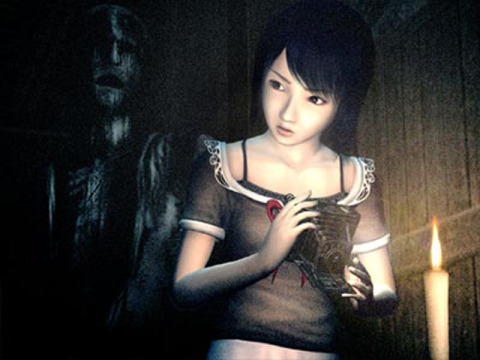
Sometimes where you least expect them.
Regarding the Tomb Raider issue, I see where the outrage comes from. Rape is a thing too terrible for words. It should not happen, and those who commit the act are scum. No one is arguing this. Unfortunately, the world has its share of scum, and it does happen. If I correctly understand the situation into which the newly-rebooted Lara Croft is placed, she falls in with a group of scum scavengers. Realism being a priority (as in most “gritty” reboots), the developers must then confront the likelihood that a young woman in such a situation would face the threat of rape. Does it really stretch the imagination to think that facing such a threat and overpowering her attackers would be a formative event for a young woman unused to the crueler realities of life? Granted, I’m not sure I agree with the choice to make it an interactive cut scene, but it doesn’t strike me as bad writing. Showing Lara Croft at a place of weakness, especially early in the story, gives her somewhere to go. Making her vulnerable gives the strength and cunning she later comes to possess even more powerful. I believe that making characters victim of circumstance and brutality is a way to humanize them so long as they are not left in that place. By overcoming victimhood and taking control of their destinies, characters become more real, regardless of gender. Yes, the idea that players “should want to protect her” is a poor one to have when attempting to create a strong female lead, but bear in mind that Rosenberg is speaking to the same core audience that played Tomb Raider for years because they liked watching Lara Croft’s boobs solve puzzles and shoot things. The series panders to the lowest common denominator, and now Crystal Dynamics is trying to elevate it beyond that demographic. Their attempt may be terrible, laughable, or just plain offensive, but at least they’re trying.
Furthermore, despite Rachel Fogg’s tirade that Lara’s development “seemingly ONLY include[s] ‘rape’ because fuck all, that’s how women get character ladies in gentlemen, she has to be raped or attempted raped etc…no way in holy FUCKING hell is she going to gain that development through any other FUCKING means from being shot at, punched, attacked, survive a plane crash, betrayal, set on fire…nope, rape. Perfect, that’s the ‘Go to’ for female development to make her ‘Harder and badass’”, it has been revealed that the attempted rape will not be the sole characterizing event for our new Ms. Croft. Rick Kim lists a series of events revealed by Crystal Dynamics that all conspire to make Lara Croft the gravity-defying, gun-toting murderess we’re all familiar with. So, while the decision to include attempted rape may be insensitive, shocking, or dehumanizing, it is by no means the ONLY FUCKING way her character is developed.
My point in all this? The video game medium has a myriad of problems. Sexism, hyper-sexuality, and misogyny are high up on that list for many, many titles. The online culture that has grown up around gaming is ridiculously, pointlessly hostile toward women. However, for the sake of the good developers, the mature writers, and the legions of egalitarian-minded players, don’t slight the whole for the wrongs of some. When ranting about the titles that offend, please mention ones that don’t. Pulling out the weeds is only half the battle; one must also plant flowers if one is to have a pleasant garden.
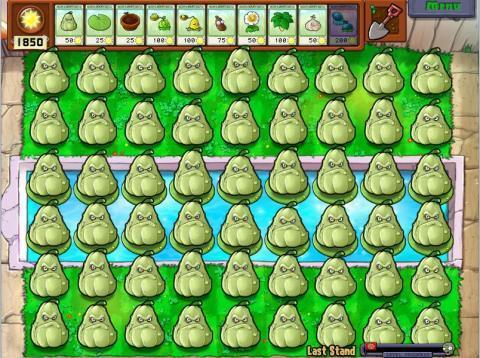
“Pleasant” is a relative term.
And for the love of God, stop treating the new Tomb Raider likes it’s the second coming of Custer’s Revenge.








May 31, 2012
Thoughts Upon Completion of My Second Book
The obsessively-devoted fans among you may have noticed that I tweeted something Tuesday about having finished my final read-through of She Returns From War prior to submitting it to the Robot Overlords. Today is the day that submission takes place, and I have a whole mess of thoughts about it. Since you stopped by, I suppose I should tell you that I’ve embedded a virus into this post which locks out all browser functions except page scrolling for ten minutes. That should be enough time for you to read and contemplate my earth-shattering reflections on the writing process for my second book. Ten minutes also happens to be exactly how long it takes Dr. Mario to divine the cure for the virus.
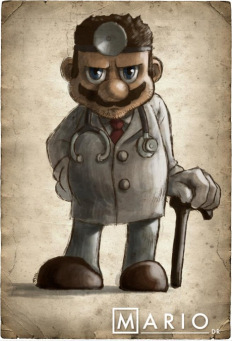
He will not, however, cure your interpersonal bullshit.
First of all, I want to acknowledge and thank all of the wonderful, insightful, and necessarily harsh beta readers that helped me get a bead on the revision process: AA confederates Wes Chu, Laura Lam, Mike Johnson, and Rob Haines; family and friends Mel, Nancy G, and Bill; and my Ideal Reader, the beautiful Tori. Without their selfless commitment, tireless line editing, and shrewd suggestions, I would have been stuck carving a metaphorical monument in the desert without anyone standing at a distance shouting, “Dude! Noses do not look like that!” Then, when my bulbous, misshapen monstrosity was subjected to the world’s scorn, I totes would have rage quit on the spot.

And I wouldn’t have been the first.
The experience was not without instructional value, either. Given that I have only one other episode of novel composition and revision under my belt, my sample size is nowhere near large enough to generalize these findings. However, you should still have about eight minutes left on that browser lockdown, so here we go:
1) Taking a break doesn’t result in the subatomic destabilization of the universe – When I first decided to put the manuscript down for (what ended up being) a month, the idea terrified me. It flew in the face of my own dichotomous work ethic and the advice of every writer who has pontificated on the subject of dedication. However, as it turns out, not much happened. Not only did I not miss my deadline, but none of my beta readers even noticed the seam where I abandoned the narrative in favor of vicariously slaughtering eldritch horrors and gangs of roving marauders in Skyrim. A word of warning, though: this only works if you’ve made good headway and still have some room to breathe. I wouldn’t suggest it to anyone who is brushing up against a deadline.
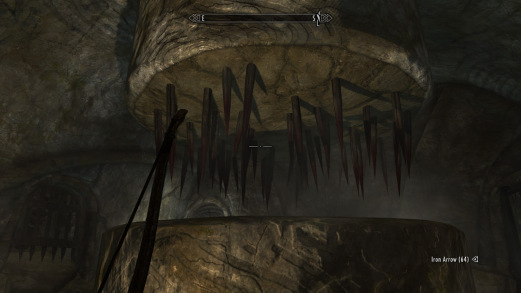
I’m pretty sure most publishers have some version of this handy for tardy authors.
2. Revisions come in many forms – Stephen King advises writers to cut out 10% of their first drafts. I know writers who completely restructured their books during the revision process. Thus, when my final version trimmed a scant 1.5% off the word count and featured no major plot alterations, I found myself beset by an angry, flapping horde of doubt moths. They inconsiderately flitted about my ears, their wings whispering that I had not done enough. Horrible, dust-covered bodies rubbed against the open wounds of my insecurities. I fought them to a stalemate with my final read-through, however; while not perfect, I’m happy with how the manuscript turned out. Very happy, as a matter of fact. I’ve yet to see what the Overlords think of it, but it seems that the amount of revision isn’t directly proportional to the quality of the manuscript in all cases.
3. Finishing a contracted novel feels very different from finishing a casual novel – This one surprised me. When I finished The Dead of Winter, I felt a great sense of accomplishment. A milestone had been reached, a Rubicon had been crossed, a baby had been fired out of a cannon, etc etc. One more life goal to check off. Finishing She Returns From War, however, brought a new and unexpected sensation: immense relief. Yes, I still felt the heady rush of “Holy shit, I just finished writing a book”, but there came attached a gigantic helping of “Thank God I didn’t fuck up.” I can actually relax and have hot, sweaty, guilt-free fun now. Or I could, but…
4. I no longer remember how to have fun – During both the writing and revision processes, my gaming was essentially limited to AFK mining in EVE , and my recreational reading only happened on the bus in to work. Since finishing my final read-through two days ago, I have spent my evenings engaged in the following “fun” activities: A) spending 60 minutes yelling profanities at the singularly hardest boss fight in Xenoblade Chronicles; B) napping; and C) making a spreadsheet in Open Office to make calculating production costs in EVE easier. I hope this affliction is temporary. If it isn’t, I suppose there’s nothing for it but to get to work on my next book.
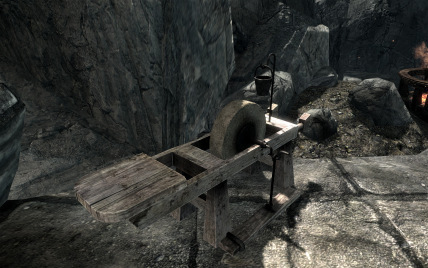
Sit your ass down, son. This is your fun now.








May 14, 2012
Review – The Devil’s Carnival
 After the triumphant collaboration on 2008’s REPO! THE GENETIC OPERA, a film hailed by The Hollywood Reporter as “the next Rocky Horror Picture Show”, director Darren Lynn Bousman and writer/actor Terrance Zdunich had no where to go but down—ALL THE WAY DOWN… TO HELL. These showbiz black sheep invite you dive into the ashes with them on their groundbreaking, new musical film fusion event, THE DEVIL’S CARNIVAL. In THE DEVIL’S CARNIVAL, sinners are invited to a theme park where they endure the repetition of their transgressions. What chances do a conniving kleptomaniac, a gullible teenager, and an obsessed father stand when facing their own moral failings? Lucifer and his colorful cast of singing carnies invite you to grab a ticket to THE DEVIL’S CARNIVAL to find out!
After the triumphant collaboration on 2008’s REPO! THE GENETIC OPERA, a film hailed by The Hollywood Reporter as “the next Rocky Horror Picture Show”, director Darren Lynn Bousman and writer/actor Terrance Zdunich had no where to go but down—ALL THE WAY DOWN… TO HELL. These showbiz black sheep invite you dive into the ashes with them on their groundbreaking, new musical film fusion event, THE DEVIL’S CARNIVAL. In THE DEVIL’S CARNIVAL, sinners are invited to a theme park where they endure the repetition of their transgressions. What chances do a conniving kleptomaniac, a gullible teenager, and an obsessed father stand when facing their own moral failings? Lucifer and his colorful cast of singing carnies invite you to grab a ticket to THE DEVIL’S CARNIVAL to find out!
One expects certain things from a film titled The Devil’s Carnival. Bizarre carnies, sinister tents, judgments grumpily pronounced by the Prince of Darkness. Darren Lynn Bousman and Terrance Zdunich deliver on all of these points, but their manner of delivery provides some interesting and unexpected twists to what initially seems like a played-out theme.
Pulling from hell’s tried-and-true legacy of contrapasso, Zdunich’s Lucifer has established an afterlife that crafts punishments to fit any given sinner’s primary flaw. A career thief bets her soul in a coin toss for a chance to win a gigantic diamond; a girl with a thing for bad boys is seduced by a smooth-talking, knife-tossing greaser. What gives this underworld its unique flair is the spirit in which these punishments are doled out. Rather than espousing the classic motif of eternal agony just for shits, Lucifer administers each sinner’s fate as a sort of trial, a theme that should come as no surprise to those familiar with Bousman’s filmography. The Great Deceiver wants to know if his latest tenants have learned from the sins that brought about their untimely deaths. Although their ultimate fates are not surprising, the film gives the impression that our sinners could have avoided them by not falling for the obvious traps set before them. The closing number confirms this theme as the Traitorous Angel decides to offer grace for sinners at a lower price than they might find in heaven, here portrayed as the workshop of a doll-maker (Paul Sorvino) who may or may not share family ties with Tony Soprano.
What really sets this film apart, however, is the music. As a general rule, I am not a fan of musicals; I believe the genre is perfectly suited for satire and should only be given a serious tone if death threats are on the table. The Devil’s Carnival is a rare example of the exception to this rule. The songs move effortlessly through the film’s many moods, capturing everything from the energetic insanity of the carnies to the introspective grieving of a father for his son. Zdunich himself only sings one number, modestly taking a back seat to the film’s other talent. Said talent includes Emilie Autumn, Skinny Puppy‘s Ogre, Five-Fingered Death Punch‘s Ivan L. Moody, and Briana Evigan (whose smoky, seductive voice is tragically wasted on the likes of Step Up 2). With solid arrangements and clever lyrics supporting them, these artists supply the Carnival’s heart and soul.
Despite its strengths, the prominent cast also ends up being the film’s largest pitfall. Bousman commented on this very issue during the showing I attended, saying that having over a dozen main characters in an hour-long film cuts screen time for everyone. Characters like Alexa Vega’s Wick and Bill Moseley’s Magician felt tacked-on, a sort of in-joke for fans of Repo! The Genetic Opera. I don’t fault Bousman and Zdunich for giving the larger roles to those who never dwelt in the shadow of GeneCo; they were making a different movie, after all. Still, making posters for the minor characters leads one to think they will have a larger role than they actually do. There’s a reason Star Trek never showed red shirt guys in episode trailers.
My other complaint can and should be taken as a compliment: The Devil’s Carnival ends far too early. Lucifer’s decision to put heaven out of business has scarcely left his lips when the credits begin rolling, eliciting agonized groans from the audience (or maybe that was just me). I want more of this underworld. I want to see how God(father) reacts to Lucifer’s ambition. I want to know how the carnies came to serve the Fallen One. The world Bousman and Zdunich have created intrigues me, but all I can do for now is listen to the soundtrack and hope they receive enough support to continue the story.








May 4, 2012
Bethesda Announces “Elder Scrolls” MMO
“And all throughout the land,
There was the sound
Of stirring macaroni.”
–Everyone Got Laid, The Billy Nayer Show
Such were my initial thoughts upon hearing the big announcement yesterday. Despite the hundreds of hours I’ve put into Skyrim (many of which occurred during the months I was “working” on my book), I am not at all excited at the prospect of an Elder Scrolls MMO. When the announcement first popped up on my Twitter feed, the most dominant emotion it provoked was exasperation. No gushing, no flushing, not even the ghost of a “I’ll check it out at some point.” Just pure, unadulterated “Ugh.” Imagining the look on my face makes me feel dirty, like I should go put four-inch gauges in my ears on the way to pick up some lime-green sunglasses.

Seriously. I am a dick.
This is odd on several levels. First, as previously mentioned, I have played the shit out of Skyrim, and I haven’t even finished the main quest line on any of my toons yet. My mods are scarce, my unexplored locations scarcer, and–as promised earlier on this very blog–every peasant girl has a horse to ride because I am as wealthy as I am lawful good (on one toon, anyway). It’s exceedingly rare for me to put this much time into a single-player game, but Skyrim just so goddamned big. Whatever the quality of their storylines, Bethesda knows how to make worlds that are a hell of a lot of fun to explore.
Second, I love me some MMO’s. Had my father’s economic philosophies been switched at birth, I would no doubt be the embodiment of the basement-dwelling loser, forever glued to my tricked-out, parent-purchased PC, hoarding achievements like candy and out-earning Chinese gold farmers. I’m not entirely sure where the sense of overwhelming satisfaction I get from such activities comes from, but I know I’m very susceptible to it given the right circumstances. I’ve spent scores of hours farming mats to craft a weapon for one of Tori’s toons when I run out of shit to do on mine. Were I free of the need for employment, I would surely be one of those mad multi-boxing fools that most players pity in a slightly jealous manner.

My alt fleet would overwhelm most alliances.
Why, then, am I not tripping over furniture that foolishly placed itself in the path of my excited frolicking? Because we don’t need another high-fantasy MMO. The genre, while worthy in its own right, is so completely played out that developers heralded for their innovations in the wider MMO field still can’t break away from it. Both Guild Wars 2 and Tera are bringing exciting new things to the table, but their vehicle of delivery still involves two-handed swords and iron-clad mammaries. When it comes to setting, even JRPG developers–whose reception among fans is usually in direct proportion to how classic a game feels– have shown more forward thinking than MMO developers in the past six years.
This is all the more puzzling given that Bethesda owns the rights to Fallout. Yes, Skyrim was more of an immediate commercial success than anything they’ve produced to date, but I have a rather strong suspicion that many of Skyrim‘s fans have no interest in an MMO. When they realize that it won’t have Skyrim-caliber graphics combined with a multiplayer style reminiscent of Fable, they will lose interest. A Fallout MMO, while still suffering from sloppy combat and life-threatening concentrations of the color brown, would have at least given fans of the genre a different setting to explore between bong hits.

“Dude, your fuckin’ tongue is, like, fuckin’ huge. Man, now I want some fuckin’ sausage. But fuckin’ not in a gay way.”
But no. Instead, Bethesda is playing it safe and going the route of the chainmail bikini. Unless they manage to top both Tera and Guild Wars 2 in terms of hype and innovation, their star in the MMO sky promises to flash for a moment before vanishing forever.








April 27, 2012
Xenoblade Chronicles: More Impressions
My unexplained, unexpected, and certainly unforgivable hiatus from posting last week was unequivocally due to an unexpected head cold that left me unable to properly let my thoughts undulate, resulting in an uninspiring lack of topics to discuss.
It should come as no surprise, then, that I have elected to continue my coverage of Xenoblade Chronicles. In my defense, I should probably say that my utter lack of other topics is only a portion of my reason for posting this. It’s rare that I have the chance to cover a new release, and the game is far too large to squeeze into a single link of the great sausage chain that is my blog. Tori’s already put well over 30 hours into it, and her ragtag group of impossibly pretty adventurers has yet to make it to the enemy country (located on the other god’s corpse for those who aren’t familiar). I assume the second half of the game takes place within the steely loins and supple curves of the Mechonis, so it seems the marketing guys weren’t lying when they said 60+ hours for the main story alone.
As far as that main story is concerned, I’m pretty impressed with it thus far. Although slow in getting started, it’s seeded with enough mystery and quality worldbuilding to make me honestly interested in seeing how everything fits together. Everything from (what appears to be) soul-swapping main characters with villains to one-line mentions of genetic designs implemented centuries before is designed to make an invested player cock their head and say, “Huh?”

"Baroo?" is also commonly used.
These moments are all the more important because this game can go from amazing magical land of wonderment to curse-inducing vortex of frustration in a matter of seconds. This is due to the self-same combat system that I praised so highly in my last post. While the combat itself is still fun, Xenoblade‘s designers also decided to import another, less entertaining aspect of MMO combat: the add swarm. In certain areas of the game, mobs can become fairly concentrated due to the landscape. Floating coral reefs, for example, force the monsters to group up, which can devastate even a same-level party if you’re not cautious. Complicating matters further is the rare spawn feature, which is far more common than the name implies. These mobs are elite, wielding status ailments and bone-shattering melee attacks from within the safety of their own HP fortresses. They also love to hang out in groups of regular mobs, presumably pushing them around and stealing their girlfriends. Pulling one such group can wipe your party off the face of Bionis, and not even the game’s “pull” feature can eliminate this difficulty altogether. Thus, one can quickly find oneself cockblocked from proceeding further in the story not by a boss, but by the unfortunate placement of a rare mob.

Fortunately, I still have my train to zone macro hotkeyed.
The other main difficulty I have with this game isn’t one of gameplay or design. It’s a simple matter, really, and one to which I can give a partial pass because of cultural differences. Still, it crops up in the most unfortunate of places, screaming its presence, distracting me from what was surely meant to be a powerful moment. It bounces through cutscenes, always present, rarely silent, reminding you that you are indeed playing a game designed by people whose native tongue includes the word kawaii.

Sigh.
This fanged horror with the X-Box logo on its abdomen is Riki, the only non-humanoid member of the party. He joins up as a means of clearing his debt to his tribe of…things (said in the voice of Detention Block AA23′s overseer) and acts like a 15-year-old girl on Facebook from then on. Speaking of Star Wars, the Japanese apparently never got the memo that everybody fucking hates Jar-Jar Binks because they decided to shrink him to hobbit size, trade his ears for floppy wing-scarves, and stick him in this game. Yes, Riki is overzealously cute, but much like your seventh-grade crush, the adorability stops when he opens his mouth. The crude pidgin English that pours forth from his lungs (again, think seventh-grade crush) completely ruins any serious tone the game may be setting during a cutscene. Some of the banter between Riki and Reyn can be entertaining, but watching a crown princess weigh the decision to go to war with an animate beach ball shouting “HOM HOM FRIENDS HELP MELLIE!” behind her sort of kills the mood.












